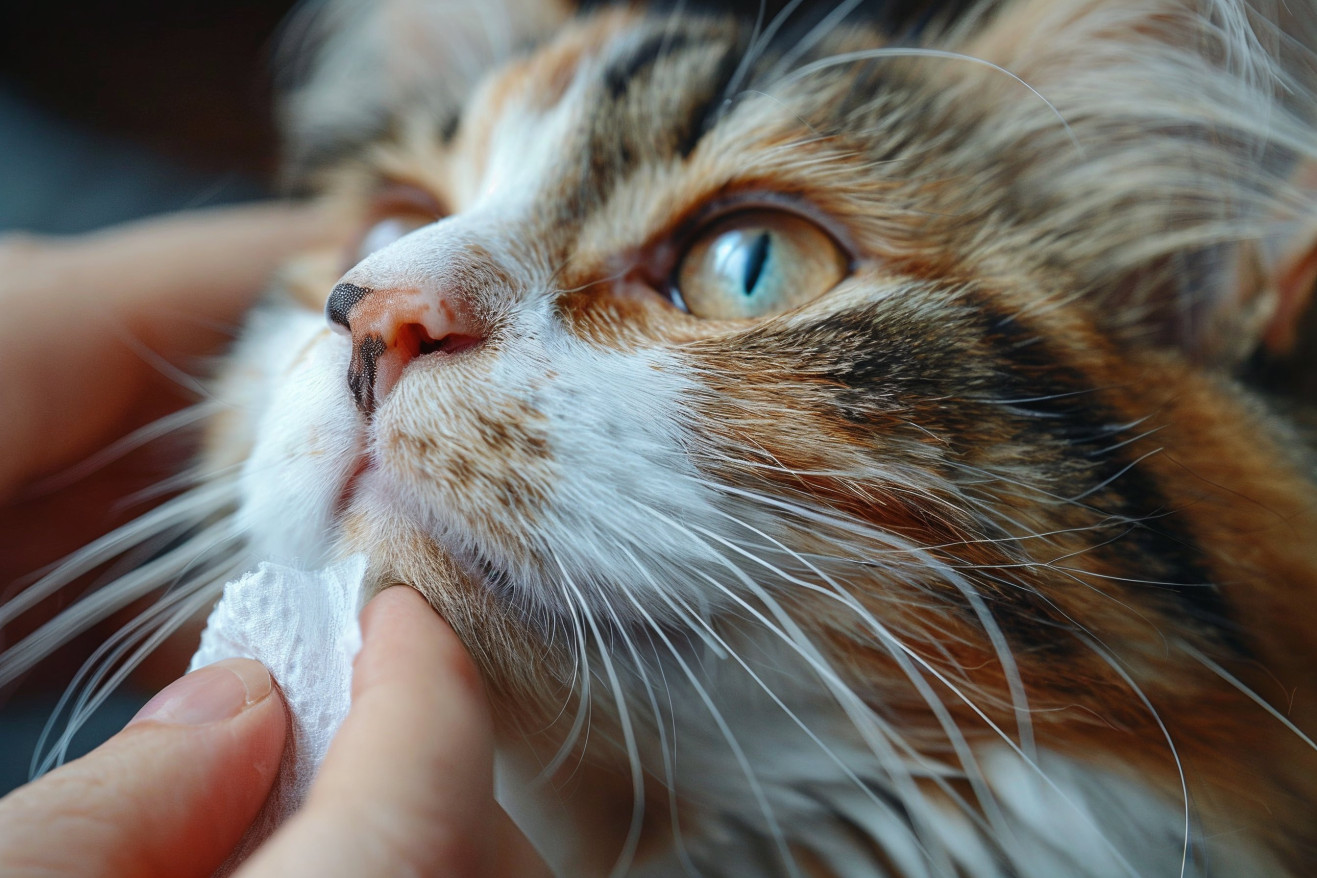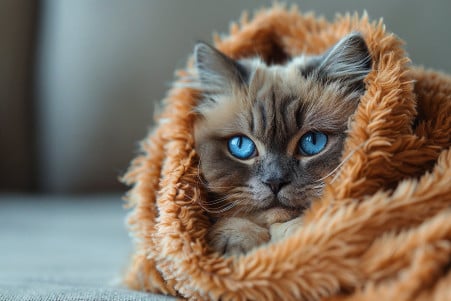Cat Nosebleeds: Causes, First Aid, and When to See the Vet
24 March 2024 • Updated 22 March 2024

If your cat has a nosebleed, it can be scary, but knowing what might be behind it and how to respond can help ensure your cat stays healthy and safe. Trauma to the nasal cavity is the most common cause of nosebleeds in cats, and it can occur during rough play, when a foreign object is stuck in the nose, or as a result of respiratory infections. However, nosebleeds can also be a sign of more serious issues like tumors or coagulopathies. While some nosebleeds will resolve on their own, others will require medical intervention.
This article will cover the most common causes of nosebleeds in cats, including everything from things that can happen in your home to more serious health issues. By referencing vets and looking at case studies, you'll also learn how to tell when a nosebleed is an emergency and when you might be able to treat your cat at home. This will help you feel more confident in your ability to provide first aid and know when you need to seek medical care for your cat.
What are the main causes of nosebleeds in cats?
Causes of Nosebleeds in Cats
Nosebleeds in cats can be caused by a number of things, some of which are relatively minor and others that may be indicative of more serious health issues. One of the most common causes is trauma to the nasal cavity, which can occur during rough play, accidents, or when foreign objects become lodged in the nose. Even benign tumors or nasal polyps can cause nosebleeds due to the irritation and inflammation they cause, according to PetHealthNetwork.
Respiratory infections, including bacterial and viral infections, are another common cause, according to Dutch.com. Allergies that cause nasal inflammation and lead to excessive scratching or rubbing can also cause nosebleeds. In some cases, nosebleeds may be a sign of a more serious health issue, such as cancer, liver or kidney disease, or blood clotting disorders like hemophilia or von Willebrand's disease.
In one example from PetMD, a 12-year-old cat was brought in after experiencing recurring nosebleeds. After running a series of tests, the cat was diagnosed with nasal tumors, a serious condition that required specialized treatment. In another example from BetterVet, a cat's nosebleeds were eventually linked to poisoning after other potential causes were ruled out. Whether the cause is minor or more serious, it's important to identify it in order to ensure that your cat receives the appropriate care and to prevent future nosebleeds.
First Aid for Cat Nosebleeds
If your cat is having a nosebleed, there are a few things you can do at home to help stop the bleeding. First and foremost, according to VCA Animal Hospitals, make sure to keep your cat calm, as excitement can lead to an increase in blood pressure and more bleeding.
After that, you can try putting an ice pack or cold compress on the bridge of the nose. This can help, as Vetster notes that it can help constrict the blood vessels and slow the bleeding. Make sure that you don't cover your cat's nostrils, though, as they need to be able to breathe.
Don't put anything absorbent, like a cotton swab, in your cat's nose, as this can cause sneezing and make the bleeding worse, according to Catster. Also, don't give your cat any medications unless your vet tells you to.
While these at-home remedies can be helpful in some cases, Wagwalking.com warns that if the bleeding doesn't stop or your cat is in distress, you should get your cat to the vet right away. It's important to know when to administer first aid and when to get professional help to ensure that your cat is safe.
When to Get Emergency Veterinary Help
If a cat's nosebleed is happening in conjunction with other symptoms, such as excessive bleeding, difficulty breathing, or signs of shock, it's important to get to the vet right away. VCA Animal Hospitals notes that internal bleeding, which may not be visible, can be especially dangerous and lead to organ failure if it's not treated.
Fetchpet.com explains that if a nosebleed results in more than a cup of blood or if the cat seems weak or sick, it's time to go to the emergency vet. The Spruce Pets recommends taking your cat to the vet if the bleeding continues or happens again because this could be a sign of a more serious issue.
Veterinary professionals stress the importance of being safe rather than sorry. As Dr. Kelly Diehl of the Morris Animal Foundation says, "If bleeding persists or stops and starts, and for sure if they see more than 2-3 tablespoons of blood, they should seek veterinary care." It's important to get a diagnosis and treatment as soon as possible since nosebleeds can be a sign of a more serious issue.
Diagnosis and Treatment of the Underlying Cause
If a cat is having chronic or recurrent nosebleeds, a vet will need to diagnose the underlying cause, which will require a comprehensive diagnostic workup. According to PetMD, this typically starts with a full blood workup, including a chemical blood panel, complete blood count, and urinalysis. These tests can help the vet determine if there are any clotting disorders, anemia, or other systemic problems that could be causing the nosebleeds.
Based on the results of the initial blood work, the vet may then recommend more specialized tests, such as a coagulation profile to assess the cat's ability to clot blood, or advanced imaging, including CT scans or rhinoscopy, to get a closer look at the nasal passages. According to PetHealthNetwork, whether the bleeding is unilateral (coming from one nostril) or bilateral (coming from both nostrils) can also help the vet determine the cause.
Once the vet has determined the underlying cause, whether it's a respiratory infection, nasal tumor, or clotting disorder, they can then treat the issue. According to PetMD, this may involve the use of medications, such as antibiotics, antifungals, or vitamin K, or in some cases, surgery to remove a foreign body or mass. No matter what the treatment involves, it's important for pet owners to make sure they follow their vet's instructions and complete the full treatment plan to make sure the nosebleeds are fully resolved and don't come back.
How to Prevent It and What to Do If It Happens
To prevent nosebleeds from happening in the future, make sure your cat is in a safe environment and is generally healthy. Dutch.com suggests making sure that your cat has a safe play area that is free from anything that could cause trauma to the nose or head. Additionally, make sure that your cat is eating a healthy diet and getting enough exercise, as this can help boost the immune system and reduce the risk of allergies or respiratory infections that could lead to nosebleeds.
If your cat has an underlying health condition that makes them more prone to nosebleeds, such as liver or kidney disease, make sure to work with your vet to make sure that the condition is being managed with medication, diet, or other treatments, according to BetterVet. Also, make sure that you are taking your cat to the vet for regular check-ups so that their health can be monitored and any signs of nosebleeds or other concerning symptoms can be caught early.
Finally, make sure that you know the signs that indicate that you should seek medical attention for your cat, such as if the nosebleeds are happening frequently or are severe, or if your cat is having trouble breathing or is lethargic. This way, you can make sure that you are getting your cat the help that they need as soon as possible. By working with your vet and making sure that you are following their recommendations for care, you can make sure that your cat is as healthy as possible and that the risk of nosebleeds is minimized.
Conclusion: Make Sure You're Taking Care of Your Cat's Health
While nosebleeds in cats can be scary, they can often be treated with the right first aid and immediate medical attention. If your cat has a nosebleed, make sure to stay calm and apply a cold compress to the bridge of their nose to help constrict blood vessels and stop the bleeding. Just make sure that you don't put anything inside of your cat's nose, as this could make the situation worse.
It's also important to make sure that you figure out what caused the nosebleed in the first place, as it could be a sign of a larger issue, including a respiratory infection, an allergy, or even cancer. The Palm Beach Post and The Atlanta Journal-Constitution both say that it's important to make sure that you take your cat to the vet right away, as nosebleeds can be a sign of a larger issue that needs to be addressed as soon as possible.
If you work with your vet, you should be able to figure out what caused the nosebleed and come up with a treatment plan that will help you address the issue and make sure that it doesn't happen again. By making sure that you're staying on top of your cat's health and looking out for any symptoms that could be a cause for concern, you can make sure that your cat stays healthy.


